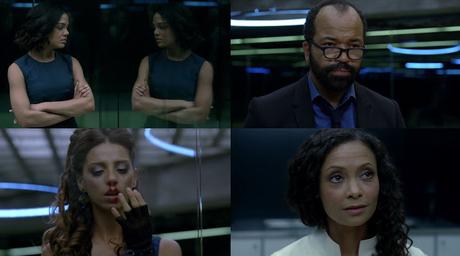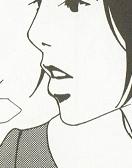If I had a world of my own, nothing would be what it is, because everything would be what it isn’t.

One of the ways in which Westworld works, but within itself and as a metaphor for any public creation made for an audience, is that everything circles around the question of whose story this is. Does the creator own his creations because he controls them, because they would not exist without them, because he set out to create a world of his own in which everything belonged to him? Does the story belong to the paying guests? In this episode, William, changing his mind about what Westworld means to him and deciding to stay on in a place that allows him to be himself, lays claim to Dolores in that particular fashion, perhaps without realising it – he considers her a key to his own self-realisation. There are many ways in which this could go wrong, and maybe without any confirmation, we can simply count becoming the Man in Black as a possible option, but the twist here is that Dolores is self-aware enough, and protective of her own path, that she rebukes the idea that she exists solely to shed light on his hidden true self. She claims that back, claims being allowed to give her own life meaning back rather than accepting what he claims is its meaning.
The ultimate power is creating something that is utterly non-aware of the nature of its own existence. Ford was a terrible god before, working within a system that used ignorance as justification for unspeakable violence – what does it matter that the guests perpetrate violent acts against the hosts, if they can simply be wiped of all trauma and hit the ground again as new, back in their endless loops? The very smartly named Trompe L'Oeil builds to the inevitable in a very quiet way. First, the episode reveals the precise nature of the programming that makes it impossible for hosts to comprehend their situation. When guests mention the outside world, or anything that conflicts with their perception of reality, their programming “blacklists” the exchanges, and makes it impossible for them to see what’s right in front of them. More literally, when they see things that conflict – like photos from the outside – their brain hides the truth from them entirely, makes it impossible to create meaning. “They don’t look like anything to me”, says Hector when he is shown pictures from the outside. “They don’t look like anything to me”, says Bernard, after awkwardly following Theresa down a rabbit hole that he can only perceive as far as she explains it to him. A door, where he doesn’t see a door, the instruments of creation where he sees an empty cabin, the very space in which Ford is creating a side-story of his own, where Bernard sees nothing. Sketches of himself, that show that he is another brainchild of the mentor and friend that he so admires, that he has been a loyal host all these years, are hidden from him because of the nature of his programming.
So the tragic reveal here is perhaps not necessarily that Bernard is a host, which we have seen coming for episodes now, but that the host that would have been best placed to comprehend himself, the host that knows the most about the technical nature of this undertaking, is also the one who is most ignorant of his own nature. It is easier to understand this considering how much intervention there is in Westworld, how artificial this place is – but Bernard works behind the scenes, in the real world. And yet, when Ford snaps his fingers, he commits murder.
Arnold thought that creation became meaningful with consciousness. He had a very dark perception of humanity, and in creating the hosts, maybe hoped to invest his time and energy into the next best thing following humanity. Ford, on the other hand, is obsessed with the idea that this is creation, his world, his property, and therefore entirely bound to his will. This perception conflicts even with the corporate interests of his financiers, DELOS, which, as Charlotte Hale puts it, does not care about the adventure or the hosts at all, only about all that data that has accumulated over 35 years and has never made it off-world due to Ford’s obsession with keeping it. None of that truly takes into account what the hosts want, because on the one hand, Ford’s entire conception of them as innocents not burdened with the peacock feathers of intelligence falls apart when they become conscious, and intelligent, which seems both inevitable and irreversible. On the other hand, it doesn’t even matter anymore what the original intentions here may have been, that titanic conflict of purpose and meaning between Ford and Arnold – because Arnold is dead, and whatever his legacy will be, it is buried deeply in the hosts, and they will make of it what they will as they reclaim their own stories.
Their own stories – Dolores inside Westworld, making her way to the unclaimed territory from which nobody has returned, Maeve outside Westworld, comprehending how truly brutal these men are that aren’t god when she watches her friend being killed. Sylvester tells her that everything about this place, including the skin on her back, was designed to keep her here – which is exactly the reason why she needs to run, because after all, isn’t Bernard’s ignorance the worst prison of all?
Maeve: At first I thought you and the others were gods. Then I realised you were just men. And I know men. You think I’m scared of death? I‘ve done it a million times. I’m fucking great at it. How many times have you died? Cause if you don’t help me, I’ll kill you.
Random notes:
The acting in this episode, between Thandie Newton and Jeffrey Wright, is astonishing. The most heart-breaking moment perhaps, when Bernard realises what he is – “I’m not one. My wife. My son. They’re real. I was a father. My poor boy.”
Elsie remains disappeared, but we do not know who disappeared her (I suppose it depends on whose trail she was following down there).
It may still be one of the greatest red herrings this season has to offer, but the way William starts to talk about Westworld – as a place that has some kind of hidden meaning that can be found, something that is at the end of all of this – sounds a lot like someone else does. And the things that are revealed about him are a far departure from the innocent man who chose the white hat.
Ford’s revelation to Theresa – that he knew about her ploy to destroy his narrative by pretending the hosts were malfunctioning, poor Clem – leaves it a bit ambiguous if he is simply overhearing everything or actually put those words into Charlotte Hale’s mouth. Is there even an outside anymore? (also, Ford’s line to Charlotte – “I didn’t know that someone with your level of insight would need more reflection. “)
A few questions here: the sketches in the underground lab reveal that Ford created a prototype of Dolores here, which leads to the question of whether the Dolores’ we have been seeing on screen are the same model, or if at some point, she was replaced by a different model. From previous episodes, I would have thought that Dolores, the oldest model in the park, was Arnold’s creation. Also, Ford tells Theresa that Bernard is younger than Arnold’s death (and a few people have speculated that Ford created Bernard in Arnold’s image) – but he, along with that prototype model, was created in Ford’s secret lab.

